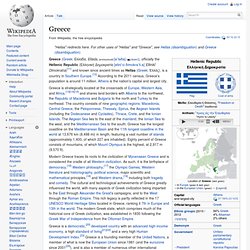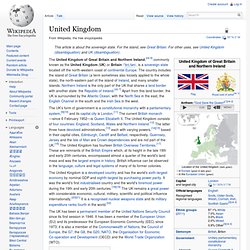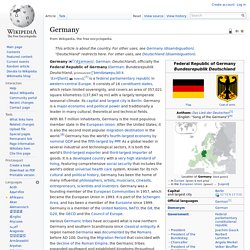

Italy. Denmark. Denmark ( i/ˈdɛnmɑrk/; Danish: Danmark)[N 10] is a Scandinavian country in Northern Europe.

The southernmost of the Nordic countries, it is located southwest of Sweden and south of Norway, and bordered to the south by Germany. The Kingdom of Denmark[N 11] is a sovereign state that comprises Denmark and two autonomous constituent countries in the North Atlantic Ocean: the Faroe Islands and Greenland. Denmark proper has an area of 43,094 square kilometres (16,639 sq mi),[9] and a population of 5,659,715 (January 2015).[3] The country consists of a peninsula, Jutland, and the Danish archipelago of 443 named islands,[10] of which around 70 are inhabited. The islands are characterised by flat, arable land and sandy coasts, low elevation and a temperate climate. The Constitution of Denmark was signed on 5 June 1849, ending the absolute monarchy which had begun in 1660.
Simon Niepmann. Lucas Tramer. Greece. Greece (Greek: Ελλάδα, Elláda, pronounced [eˈlaða] ( )), officially the Hellenic Republic (Ελληνική Δημοκρατία [eliniˈci ðimokraˈti.a] Ellīnikī́ Dīmokratía)[11] and known since ancient times as Hellas (Greek: Ἑλλάς), is a country in Southern Europe.[12] According to the 2011 census, Greece's population is around 11 million.

Athens is the nation's capital and largest city. Modern Greece traces its roots to the civilization of Mycenaean Greece and is considered the cradle of all Western civilization. As such, it is the birthplace of democracy,[16] Western philosophy,[17] the Olympic Games, Western literature and historiography, political science, major scientific and mathematical principles,[18] and Western drama,[19] including both tragedy and comedy. Kristoffer Brun. Are Strandli. LM1x. Henrik Stephansen. Jérémie Azou.
Peter Galambos. Péter Galambos (born 9 September 1986 in Vác) is a Hungarian rower.

He won the silver medal in the lightweight single sculls at the 2012 World Rowing Championships. Galambos studies economics and management at Óbuda University in Budapest.[1] References[edit] External links[edit] Péter Galambos at RowingOne.com. United Kingdom. The United Kingdom of Great Britain and Northern Ireland,[nb 6] commonly known as the United Kingdom (UK) or Britain /ˈbrɪ.tən/, is a sovereign state located off the north-western coast of continental Europe.

Italy. Netherlands. Eric Murray (rower) Eric Gordon Murray MNZM (born 6 May 1982) is a New Zealand rower and Olympic gold medalist at the 2012 London Olympic Games.

He has won four consecutive World Rowing Championships gold medals and has set two world best times. His first world championship medal was as a member of the New Zealand coxless four at 2007 World Rowing Championships. Murray then went on to become a member of the triple World Champion coxless pair with fellow coxless four member Hamish Bond. They won gold at the 2009 World Rowing Championships, then went on to retain their title at the 2010 World Rowing Championships.[1] and 2011 World Rowing Championships.
Murray's achievements in both the coxless four and the coxless pair have seen him win two Halberg sports awards[2] team of the year, firstly in 2007 with the four, and then in 2009 with Bond. In late December 2011 Murray set a new world record on the indoor rowing machine. Hamish Bond. Hamish Byron Bond MNZM (born Dunedin, 13 February 1986) is a New Zealand rower and Olympic gold medalist at the 2012 London Olympic Games.

He has won four consecutive World Rowing Championships gold medals and has set two world best times. Croatia. Croatia ( i/kroʊˈeɪʃə/; Croatian: Hrvatska pronounced [xř̩ʋaːtskaː]), officially the Republic of Croatia (Croatian: Republika Hrvatska Croatia today has a very high Human Development Index.

The International Monetary Fund classified Croatia as an emerging and developing economy, and the World Bank identified it as a high income economy. Croatia is a member of the European Union, United Nations, the Council of Europe, NATO, the World Trade Organization and a founding member of the Union for the Mediterranean. As an active participant in the UN peacekeeping forces, Croatia has contributed troops to the NATO-led mission in Afghanistan and took a non-permanent seat on the UN Security Council for the 2008–2009 term. The service sector dominates Croatia's economy, followed by the industrial sector and agriculture. Etymology. Germany. Germany ( i/ˈdʒɜrməni/; German: Deutschland), officially the Federal Republic of Germany (German: Bundesrepublik Deutschland, pronounced [ˈbʊndəsʁepuˌbliːk ˈdɔʏtʃlant]),[7] is a federal parliamentary republic in western-central Europe.

It consists of 16 constituent states, which retain limited sovereignty, and covers an area of 357,021 square kilometres (137,847 sq mi) with a largely temperate seasonal climate. Its capital and largest city is Berlin. Nils Jakob Hoff. Kjetil Borch. Ondřej Synek. Ángel Fournier. Ángel Fournier at RowingOne.com.

Marcel Hacker.